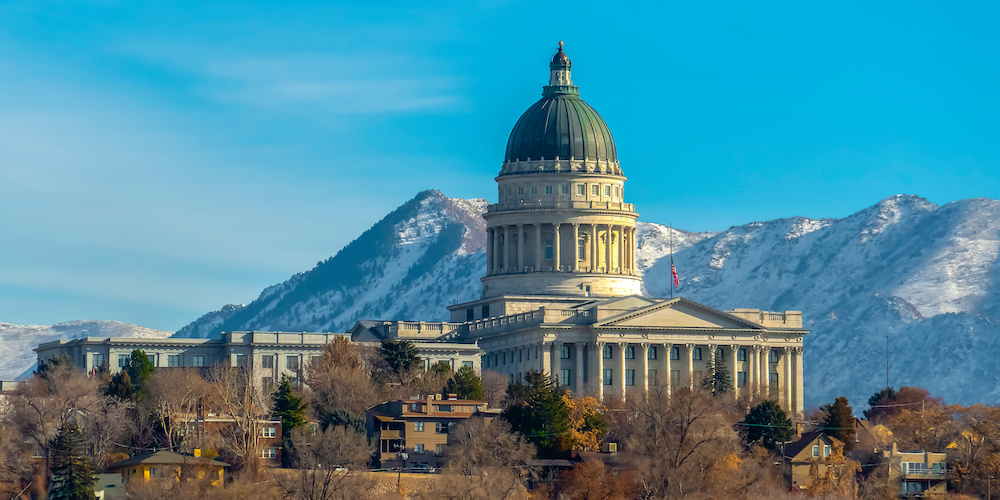On January 16, the Utah Legislature convened its 2024 session under the leadership of Republican Senate President J. Stuart Adams and House Speaker Mike Schultz. During the scheduled 45-day session, lawmakers will address a wide range of issues, including healthcare, the state budget, economic development, public safety, and education.
Medicaid
Introduced on the first day of session, HB 51 addresses the risk management and financial aspects of the state’s Medicaid program. Specifically renaming the Medicaid Expansion Fund which was created in 2019 when Utah fully expanded Medicaid, to the Medicaid ACA Fund. The bill will also extend the fund’s sunset date and merge the Medicaid Restricted Account into the Medicaid Growth Reduction and Budget Stabilization Account. The bill also proposes a one-time appropriation of $23.7 million to the Medicaid Growth Reduction and Budget Stabilization Account for fiscal year 2024.
HB 340, currently under consideration by the House Rules Committee, would require the Department of Health and Human Services to seek information on ways to reduce Medicaid costs while maintaining or improving services for Medicaid enrollees. The bill would also authorize the Department to initiate requests for proposals and apply for Medicaid waivers to implement these proposals. Further, the bill permits the use of the Medicaid Expansion Fund for certain programs and amends rules regarding the types of drugs healthcare providers can dispense in their offices.
Additionally read on January 16, HB 193 would authorize the use of funds from the Medicaid Expansion Fund to cover Medicaid costs for certain pregnant and postpartum women. This measure suggests repealing an existing cost-saving protocol related to Medicaid expansion and introduces a new protocol in case the Medicaid Expansion Fund is at risk of depletion. The bill also proposes that the Department of Health and Human Services seek approval to raise the household income eligibility limit for Medicaid coverage of these women to 185% of the federal poverty guidelines, as well as to extend Medicaid coverage to pregnant and postpartum women holding permanent resident cards. Further, the bill outlines proposed uses for specific amounts from the inpatient hospital assessment and suggests extending the repeal dates for the Medicaid Expansion Fund, inpatient hospital assessment, and Medicaid expansion hospital assessment.
SB 96, referred to the Senate Health and Human Services Committee on January 17, would modify funding provisions for nursing and intermediate care facilities, allowing the use of the Medicaid Expansion Fund for specific payments to these facilities. It would address scenarios where a reduction in federal funding impacts the quality of care provided for individuals with intellectual disabilities.
Behavioral Health
Several bills have been filed to address Utah’s behavioral health crisis, such as SB 27, which establishes the Utah Behavioral Health Commission within the Department of Health and Human Services, reorganizes existing behavioral health entities under this commission, creates a Legislative Policy Committee, and sets a sunset date for the Commission.
HB 71, endorsed by the Health and Human Services Interim Committee, would expand access to mental health services, especially in rural areas, by issuing grants to create mobile crisis outreach teams and rural behavioral health receiving centers.
Other Healthcare Bills
HB 240 would allow individuals seeking certification as a Certified Nursing Assistant (CNA) to complete their training in nursing care facilities, general acute hospitals, and other healthcare facilities approved by the Department of Health and Human Services. Currently, prospective CNAs can only receive their training from certain colleges, training centers, and hospitals approved by the state, thus expanding training opportunities. HB 240 received a favorable recommendation from the House Business and Labor Committee, with the adoption of an amendment, on Jan. 26.
HB 387 aims to update a residency grant program, allowing entities with previously awarded grants to apply for renewals. The bill, which focuses on addressing specialty workforce shortages and serving underserved populations, was sent to agencies for fiscal input on January 24.
HB 132 would permit pharmacists and pharmacy interns to substitute prescribed drugs under specific conditions. The bill includes definitions, authorizes the Division of Professional Licensing in consultation with certain licensing boards to create a therapeutically equivalent drug list and a therapeutically similar drug list, and grants rulemaking authority related to these provisions. This bill had its second reading in the House on Jan. 24.
Safety and Education
Lawmakers have also filed measures to bolster public safety and enhance education by introducing innovative programs and outcomes. Additional safety and education measures expected to be considered are:
- Strengthening public safety through criminal justice reform (several bills)
- Enhancing stipends for future teachers (HB 221)
- Establishing a scholarship program for master’s or doctoral degree students (HB 287)
Economic Development
Legislative leadership is focused on energy independence and water infrastructure as a means of promoting economic development. Other efforts include boosting affordable housing options, notably through Governor Spencer Cox’s proposal for a $150 million investment.
Lawmakers are also focused on reducing taxes, including a proposed $160 million income tax cut, building on the $400 million in cuts from the previous year. Other proposals include:
- Expanding and optimizing water supply and infrastructure (HB 241 and HB 243)
- Increasing housing stock – the governor’s $150 million proposal calls for building 25,000 starter homes by 2028
- Improving roads and transportation (SB 16)
Environment
Legislators are considering measures to address the dwindling water levels of the Great Salt Lake and other bodies of water, issues highlighted in a state agency report produced in collaboration with the University of Utah. Even though the lake rose by a net of 3.5 feet in the 2023 water year, it had reached its lowest point in history just one year earlier. Climate forecast models predict that any increases in precipitation will be undone as temperatures and evaporation increase.
Legislation under consideration would address some of the solutions identified in the report, including making sure that conserved water makes it all the way into the Great Salt Lake. Another bill addressing the problem would subsidize agriculture producers for water they do not use.



